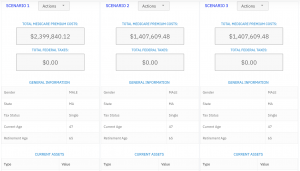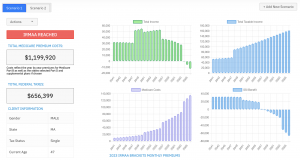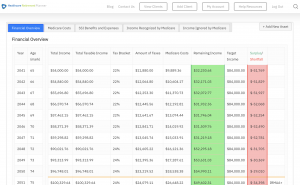Envision yourself at a carnival, about to board the most thrilling rollercoaster imaginable. That’s what diving into magi for medicare can feel like when it comes time to sign up for health insurance.
You’ve got the pass to hop on board–your Medicare card is in hand and you’re ready for the wild journey. But as soon as that income level climbs, whoosh! Up go your premiums faster than a rocket on the Fourth of July.
I remember poring over my parents’ tax returns and scratching my head at those pesky numbers dictating their monthly check deductions. Don’t get stuck in a maze without a map – I’m here to guide you through the process and show how life events can be your key to saving money.
Hang tight, because by the end of this whirlwind tour, you’ll be steering through terms like ‘modified adjusted gross income’ and ‘IRMAA’ with ease —and learning how life-changing events might just be your golden ticket to savings!
Understanding MAGI and Its Impact on Medicare Premiums
What is MAGI in the Context of Medicare?
MAGI, or Modified Adjusted Gross Income, might sound like a magic trick for your taxes. But when it comes to Medicare premiums based on MAGI, there’s no sleight of hand involved. It’s all about the numbers—specifically those that tell Uncle Sam how much you earn each year.
In simple terms, think of your MAGI as your adjusted gross income with a few twists. You’ll add back certain deductions like non-taxable Social Security benefits or tax-exempt interest. Why does this matter? Because this number decides if you’ll pay additional premium amounts for higher-income individuals under Medicare Part B and prescription drug coverage plans.
If you’re pulling in a healthy income, congrats. But keep an eye out because higher earnings could mean paying more than the standard medicare premium most folks are charged—a reality faced by beneficiaries across the board.
The Sliding Scale of Premiums
You’ve worked hard for that dough—but here’s where earning more can pinch: monthly Part B premiums climb up from 35% to 85% of their total cost if you fall into the high-earner bracket. So let’s say hello to IRMAA—the Income-Related Monthly Adjustment Amount—that sees wealthier individuals chip in extra bucks for health insurance coverage.
This sliding scale doesn’t just pick any random figure; it peeks at your tax return from two years ago using modified adjusted gross income as its guidebook (yeah, they’re keeping tabs). Higher incomes nudge people towards heftier contributions but fear not. There’s method behind what may seem like monetary madness—it helps ensure everyone pays their fair share according to what they can afford.
Digging deeper: The truth is nobody likes surprises when bills roll around—and surely not ones tied up with healthcare costs.
- Your modified adjusted gross reflects life changes—from salary hikes to retirement distributions—which could potentially catapult your income level into new heights (and rates).
- Premium tax credits have left many scratching their heads; yet remember these are influenced by both individual tax returns and joint filings alike depending on marital status—another piece of our magi-for-Medicare puzzle.
- Last but not least: Think beyond basic wage slips. Remember, income like rental earnings or stock profits also plays a big part in your financial picture when figuring out how much you really make.
Key Takeaway:
Understanding your MAGI is crucial because it can bump up your Medicare premiums if you’re a high-earner. This number isn’t just about salary; it includes things like rental income and stock profits too. Keep an eye on this to avoid premium surprises.
Calculating Your MAGI for Medicare Purposes
Cracking the code of your Modified Adjusted Gross Income, or MAGI, can feel like you’re trying to solve a Rubik’s Cube. But don’t fret. We’ll simplify it so that figuring out where you stand with your Medicare premiums won’t make your head spin.
Components of MAGI Calculation
The first step is understanding what goes into this important number. It all starts with gross income – think wages, dividends, and any other cash that finds its way to you over the course of a year. From there we subtract certain adjustments because not every dollar should count against you when Uncle Sam comes calling. And let’s be real: who wouldn’t want to take advantage of legal ways to lower their taxable income?
Your adjusted gross income (AGI) takes center stage next; this figure lays the groundwork for calculating MAGI for Medicare purposes by tweaking AGI just a tad more. Some items added back in could include non-taxable Social Security payments or tax-exempt interest — because while these may have taken a vacation from your taxable income on paper, they still count here.
To get down and dirty with details—because let’s face it, precision matters—we look at things like IRA contributions which might give us some wiggle room within our budget and even student loan interest deductions which are like little rays of sunshine on a cloudy day.
Making sure we dot our i’s and cross our t’s means subtracting those life-giving adjustments from total gross income; after all, nobody wants an unpleasant surprise when dealing with health insurance costs.
The ‘Medicare & You’ handbook, besides being bedtime reading material for financial enthusiasts everywhere, gives clear guidelines on how each piece fits together.
Now brace yourself: if numbers thrill you as much as winning bingo night at the community center does—you’ll love hearing that calculations involve pulling data straight off last year’s tax return filed with good ol’ Internal Revenue Service (IRS). Ah yes. Nothing screams excitement quite like gathering up past financial records…but hey—it helps pay monthly bills later on down the line.
| Type Of Adjustment | Possible Deductions From Total Gross Income |
|---|---|
| IRA Contributions: | – Helps reduce total reported earnings. |
| Make sure to review your tax-exempt interest, which can have implications on your tax returns. Stay informed and consult a professional if you need guidance. |
Key Takeaway:
Mastering your MAGI for Medicare doesn’t have to be a headache. Just start with your gross income and subtract the good stuff—like IRA contributions—that don’t count against you. Add back some items like non-taxable Social Security, because they still play a part in this game. It’s all about getting cozy with last year’s tax return to avoid surprises on health costs.
How Higher Income Affects Medicare Part B and Drug Coverage Costs
Navigating Part B Premiums with High Income
You might think pulling in the big bucks is all champagne and caviar, but when it comes to Medicare Part B, your wallet might feel a bit lighter. As your earnings rise, so do the premiums for Medicare Part B. Most folks pay around 25% of the premium for their medical services under Medicare Part B – that’s outpatient care and other goodies like screenings and vaccines.
But if you’re raking in more dough than average, you could be shelling out anywhere from 35% up to a whopping 85% of the total cost. That’s right; high earners face higher costs because Uncle Sam uses something called modified adjusted gross income (MAGI) to decide who pays what. So if last year was good for you financially—think promotions or hitting it big on Wall Street—you’ll want to brace yourself for those increased monthly medicare premiums come payment time.
This isn’t just chump change we’re talking about either. The standard premium gets bumped up with an additional charge known as IRMAA – that stands for Income-Related Monthly Adjustment Amount – which can feel like someone’s taken a bite out of your social security check each month.
Prescription Drug Coverage Premium Adjustments
If thinking about higher Part B rates has got you sweating bullets, don’t forget about prescription drug coverage plans—it’s another area where earning more means paying more. Similar to Part B premiums, there are extra charges slapped onto medication plan premiums based on that ever-important MAGI figure reported on your tax return.
The deal here is pretty straightforward: earn more than most people do? Expect an increase in how much you need to cough up each month just so picking up prescriptions doesn’t empty out your piggy bank completely. It’s almost like being penalized for doing well—but hey, at least everyone still gets access to health insurance regardless of their paycheck size.
Surely this gives some incentive not only keep track of deductions such as IRA contributions or student loan interest on individual tax returns but also stay savvy about any potential life-changing events documented via IRS Form SSA-44 which may impact modified adjusted gross income calculations down the line—and possibly bring relief from those pesky additional premium amounts.
Key Takeaway:
Earning big can lead to paying more for Medicare Part B and drug plans, as higher income means higher premiums. Keep an eye on your MAGI—it could bump up costs or offer chances to cut them down.
Navigating IRMAA for Medicare Beneficiaries
Picture this: You’re cruising through your golden years when suddenly, you hit a bump called the Income-Related Monthly Adjustment Amounts (IRMAA). However, it’s not all bad news. But if you’re raking in more dough than average, Uncle Sam figures you can chip in a bit more for your health care costs.
So let’s break down what exactly puts you on IRMAA’s radar. It zooms in on folks with higher incomes – we’re talking Modified Adjusted Gross Income (MAGI) levels that could turn heads at the IRS. If your MAGI is high enough to make the charts sing, brace yourself for some extra charges tacked onto those monthly Medicare premiums.
Understanding Your MAGI’s Role in Medicare Costs
MAGI might sound like an Italian grandmother everyone loves but trust me; it’s far less cuddly when it comes to Medicare. Think of it as your adjusted gross income after adding back certain deductions – things like non-taxable Social Security benefits or tax-exempt interest earnings.
This number isn’t just plucked from thin air; oh no. The Internal Revenue Service plays its part by sharing data with our friends at Social Security who then decide whether to slide into your bank account each month with those additional premium amounts. Medicare‘s got all the deets laid out clear as day if numbers are really your thing.
The Impact of Life-Changing Events on Your Premiums
We’ve all had days where life throws us curveballs—marriage, divorce or even retirement can shake up that income level faster than a Polaroid picture. Good news though: these life-changing events give you a chance to appeal those pesky IRMAA decisions because hey, circumstances change.
If Lady Luck has decided to take a vacation and left you holding bills instead of winnings from last night’s bingo game, get ready to rumble with some paperwork proving why paying higher premiums just doesn’t sit right anymore.
A Step-by-Step Guide To Appeal Those Additional Charges
All righty then. Let’s say you’ve been handed an IRMAA notice thicker than grandma’s lasagna recipe – don’t panic. Here comes Plan B: appealing IRMAAs’ decision because sometimes they get it wrong too (shocker.). You’ll need Form SSA-44 tucked under one arm and evidence supporting why their calculations were off faster than my Aunt Millie at Black Friday sales.
It won’t happen overnight, but showing them consistent dedication and effort will gradually build their trust in your abilities.
Key Takeaway:
Hit by higher Medicare costs due to IRMAA? Remember, your Modified Adjusted Gross Income (MAGI) sets the stage for those extra charges. But life’s curveballs can help you fight back. Marriage, divorce, retirement—big changes mean a shot at appealing that income-related bump in premiums.
Reporting Changes in Circumstances That Affect Your MAGI
A major salary increase or a significant drop in income can have life-altering consequences for your MAGI, and therefore affect the amount you pay for Medicare. Either way, these are more than just updates for water cooler chat; they’re life-changing events affecting MAGI that could shake up what you pay for Medicare.
Marriage, Divorce, or Loss of Income: Big Life Events and Your Wallet
Tying the knot? Untying it? Or maybe your cash flow dried up like a desert stream. These aren’t just milestones in your personal diary—they can lead to an adjustment in your reported Modified Adjusted Gross Income (MAGI). Here’s why: When there’s a significant change in circumstances—yes we’re talking marriage, divorce or losing that golden goose of an income—the amount you shell out each month for Medicare Part B and prescription drug coverage might also do some somersaults.
Sure enough, documentation requirements come into play when reporting changes to Uncle Sam. Think tax returns from yesterday years won’t matter today? Think again. You’ll need to gather those papers because they help paint a picture of how much dough was rolling in before versus after said life event. It’s about as fun as watching paint dry but stick with it—it could save you some serious green.
The Nitty-Gritty on Reporting Changes
You got hitched last June and now want everyone—including Medicare—to know? Hold off on mailing those wedding photos. What really counts is showing evidence like marriage certificates when reaching out to contact Medicare about updating your status. But remember this isn’t just ‘send-it-and-forget-it.’ Keep copies of everything since bureaucracies love their paper trails almost as much as squirrels love nuts.
If paperwork had weightlifting categories at the Olympics, IRS Form SSA-44 would be flexing its muscles in heavyweight division. This form is key when it comes time to report any adjustments due to life-changing events concerning magi calculation—be sure not only fill it out but also submit it faster than Usain Bolt runs 100 meters if possible.
A Silver Lining When Clouds Gather Overhead?
We get it – nobody likes seeing their monthly Social Security check shrink because someone decided higher premiums were necessary thanks to high incomes last year—or whenever Mother Fortune smiled upon them last time around her fickle orbit. But here’s something worth popping champagne corks over: certain situations allow beneficiaries to appeal decisions related to extra charges known internally among policy wonks as “Income-Related Monthly Adjustment Amounts” (IRMAA). Don’t delay in contesting the ruling if you think an error has been made or your fiscal status has shifted. You might just secure a reduction in those pesky fees.
Key Takeaway:
Hit a financial high or low? Big life events like marriage, divorce, or income loss can mix up your Medicare costs. Show proof of these changes to potentially lower what you pay each month. And if you think Medicare’s got it wrong, fight back—you could shrink those extra charges.
FAQs in Relation to Magi for Medicare
How is MAGI calculated for Medicare?
MAGI for Medicare tallies up your total income plus tax-exempt interest and certain deductions like non-taxable Social Security benefits.
What is the MAGI for Medicare in 2023?
The 2023 MAGI for Medicare isn’t a set number; it’s based on individual tax returns, affecting premium costs differently.
How do I calculate my MAGI?
Add up all taxable income and exclude specific IRS-approved deductions to find your personal MAGI figure.
What are the income limits for Medicare in 2023?
Income limits aren’t fixed but scaling Part B premiums kick in if individual earnings exceed $91k or $182k filing jointly.
Conclusion
Think of magi for medicare as your financial compass, guiding you through the Medicare maze. It shapes your premiums and carves out what you’ll pay for Part B and prescription drug coverage.
Dig into those tax returns; they hold the key to understanding your MAGI. Knowing this can mean better budgeting, less surprise in costs.
If income climbs, brace yourself—premiums might follow suit. But life’s twists can also bring relief if they alter that crucial MAGI figure.
Tackle IRMAA head-on with knowledge and timely appeals. Big changes like marriage or retirement? They’re not just milestones—they could dial back those monthly charges.
In essence: stay informed, report changes swiftly, appeal when necessary. Your journey with Medicare needn’t be a wild ride if you navigate with care!
Table of Contents:
- Understanding MAGI and Its Impact on Medicare Premiums
- Calculating Your MAGI for Medicare Purposes
- How Higher Income Affects Medicare Part B and Drug Coverage Costs
- Navigating IRMAA for Medicare Beneficiaries
- Reporting Changes in Circumstances That Affect Your MAGI
- FAQs in Relation to Magi for Medicare
- Conclusion
Streamlining the Medicare Surcharge Calculation Process.
Our Healthcare Retirement Planner software is designed to streamline the retirement planning process for financial professionals. By providing an efficient way to calculate IRMAA costs, our tool helps you save time and focus on other aspects of your clients’ retirement plans.
- Faster calculations: Our software quickly calculates IRMAA costs based on your client’s income and tax filing status, eliminating manual calculations and potential errors.
- User-friendly interface: The intuitive design of our platform makes it easy for financial professionals to input data and generate results with minimal effort.
- Data integration: Seamlessly integrate our calculator into your existing financial planning tools or CRM systems for a more streamlined workflow.
- Easy to Understand Reports: Export reports to easily share with your clients
- Tax and Surcharge Modeling: see how different types of income affects both taxes and your surcharges.
In addition to simplifying the calculation process, using our Healthcare Retirement Planner can also help improve communication between you and your clients. With clear visuals that illustrate how IRMAA costs impact their overall retirement plan, you can effectively convey complex information in an easily digestible format. This enables clients to make informed decisions about their healthcare expenses during retirement while ensuring they are prepared for any potential changes in Medicare premiums due to income fluctuations. To learn more about how our software can benefit both you as a financial professional and your clients’ retirement planning experience, visit the features page. Streamlining retirement planning processes can help financial professionals save time and resources, allowing them to focus on other areas of their clients’ needs. Automated calculation of IRMAA costs is the next step in streamlining this process even further.






